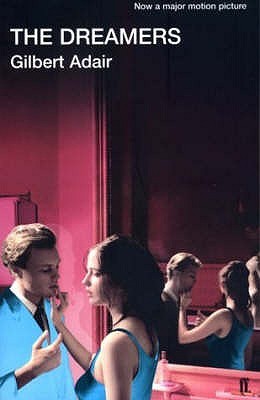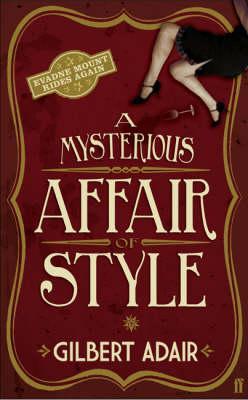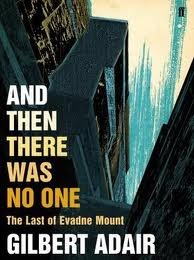I‘ve been making it a rule of late that before I see a film I should have read the book, provided it’s available in English and that I know the film is based on a book in the first place. So it has been with The Assassination Of Jesse James By The Coward Robert Ford and I Am Legend. It produces mixed results: the first one, good; the latter, bad. I’ve now had Bertolucci’s The Dreamers on DVD for some time and have been holding off watching it until I had read the book. And it being by Gilbert Adair, I’m surprised it’s taken me so long to get around to it.
The Dreamers (2003), as Adair notes in the afterword, is a rewrite of his 1986 debut, The Holy Innocents, a novel he was never happy with and constantly knocked back offers of adaptation, only to rescind when Bertolucci came calling. Not just rescind, but seize the opportunity to put past wrongs right, and come up with a new treatment, for both book and film, which he claims “may be twins but…they’re not identical.”
It seems in literature that when young Americans come to Paris they end up caught in the moment and find themselves moving into an apartment indefinitely and enjoying lots of sex. The Dreamers, in this respect, is no different to James Baldwin’s Giovanni’s Room, as its main character, the eighteen year old Matthew, has come to Paris, and in a friendshap “matured in the white shadow of the Cinématèque screen”, has come to know Théo and his twin sister, Isabelle, although his insecurity casts doubts on his worthiness of their aquaintance:
A lonely man thinks of nothing but friendship, just as a repressed man thinks of nothing but flesh. If Matthew had been granted a wish by a guardian angel, he would have requested a machine, one yet to be invented, permitting its owner to ascertain where each of his friends was at any given moment, what he was doing and with whom. He belonged to the race which loiters underneath a loved one’s window late at night and endeavours to decipher shadows flitting across the Venetian blind.
The comparison of Matthew’s loneliness to one of repression is apt in the context of the novel as Matthew, after an embarrassing misunderstanding with a friend back in America, found “the door of the closet out of which he had momentarily stepped proved to be a revolving one” and has buried what desires he has.
Echoing Matthew’s psyche, on a larger scale but in the background of the novel, the French government, under de Gaulle has designs on repressing the liberal movement, one incediary act being the closure of the Cinématèque, a beacon on the French cultural landscape standing outside of beaurocratic borders. And, with no films to see, the trio of Matthew, Isabelle, and Théo embody the ethos of the popular saying that the show must go on, adapting films into a parlour game called Home Movies that starts with petty gambling, only for the stakes to dangerously progress into a heady steam of sexual forfeit:
The Cinématèque had been forgotten. The had a Cinématèque of their own, a Cinématèque in flesh and blood. Which meant that the game was no longer played merely whenever the inclination siezed them. While they read during the day, or played cards, or fumbled one another, the curtain would rise on Home Movies night after night, at six-thirty, eight-thirty and ten-thirty, with matinees on Sunday.
But like a screening at the Cinématèque, things must come to and end and in The Dreamers Adair brings the final curtain down on a tragic note as the events of May 1968, spurned on by the Cinématèque’s closure, slip from protest to riot. Our dreamers, long lost in their liberal world, are woken by the heavy hand of conservatism.
When I pick up an Adair novel, this being my fifth, I’ve come to expect a level of trickery but such expectations were not met here, although, in hindsight, I suppose I should anticipate the unexpected from Adair. What The Dreamers is, then, is a stylistically tame novel that, in protest at its timidity, delivers a steamy soup of friendship, desire and sin that still needs a pinch of salt. The story is assuredly told, each observation a sparkling pearl, but somewhat lacks the wit displayed, such as showcased in Buenos Noches Buenas Aires, that, for me, typefies an Adair novel and makes it something that The Dreamers can only, well, dream of.




I have been thinking I should read this, especially after not liking Adair’s two Evadne Mount books. I loved the film and did not know it was a book until recently. The jury is still out on whether I will or not (read it).
You know, Candy, since I liked the Evadne Mount books and wasn’t too bowled over by this one, I daresay you may like it. And, in typical Adair fashion it’s one of those titles you can sit for a couple of hours, read, and move on. He doesn’t like to waste too much of our time, does Adair. The Dreamers has absolutely none of that knowing nudge nudge wink wink stuff that the Evadne Mount books use as regards Christie’s novels.
See, the thing is that I hadn’t read anything else by Gilbert Adair when I read The Dreamers, and I really enjoyed it. I was captivated by it in fact, and read it almost one sitting.
That said, I haven’t seen the film, or read anything else by him. I’d definitely like to read more though. I’ll find time, at some point.